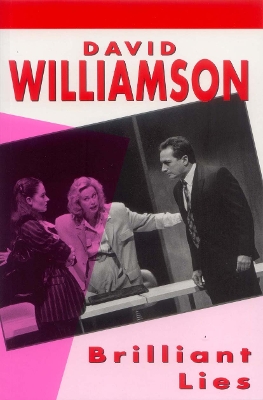I loved this play. The hypocrisy. The truth. The lies. It was freaking hysterical.
I loved this when I first read it for my Year 9 Literature class. And rereading it, I still loved it a good seventeen years later. (Which jeez talk about feeling old). But as much as I've aged, it's sad that a play written in 1993 is still as relevant today as it ever was.
Williams doesn't hold back in his critique - identifying and confronting issues of gender norms and societal perceptions and calling out the double standards that exist - that still exist. The reversal of Roe vs. Wade is an obvious example of the way in which women are marginalised - rights long fought for just being dismissed. No one would dream of legislating what a man can do with his body.
That said, when it comes to intimacy, sex and relationships between men and women, the lines are blurry. Truth, lies - it's all about perceptions - our own biases, societal ones, he said, she said, society said - there's no real clear cut answer to most of the questions being asked. Ask five different people what happened at a party and you'll get five different answers - even if the basic gist is the same. When is a man being sleazy? Is it when he flirts? When he's not 100% professional? When you're not into it? When you like him? Or don't like him? When it's more obscene than flattering? When he's awkward and trying to be friendly but has no idea how to interact with a woman? When you feel threatened? And who's answering? A jealous boyfriend/friend? A family member? Someone timid? Someone outgoing? Someone who enjoys sex? Someone who doesn't? All of these things colour our perceptions. So how do we decide what's the line? Where's the line?
Unfortunately there is no real solution to the problem. I'd love for it to be a simple answer but it just isn't. Humans are not perfect - and the flaws that come out when faced with injustice are not always pretty.
In Brilliant Lies, this takes the form of Susy who is feminine, sexual and flirty. Her dress and behaviour is liked, accepted - right up until it isn't convenient and then these things become the reasons for judgement, for disparagement.
VINCE: You want to know the truth about that girl. She came in with [Searching for words] - everything showing -
GARY: Boobs popping right out of her dress.
VINCE: Dress right up to here. [Demonstrating a point right up his thigh.] Blatant.
GARY: Trying to get herself a job.
MARION: She did get the job.
[The men look at each other, embarrassed.]
VINCE: I wouldn't have given it to her.
MARION: Gary convinced you?
GARY: I thought she had potential.
[MARION looks at GARY.]
MARION: Potential.
GARY: Work potential.
MARION: Right.
Williamson, David. (1993) Brilliant Lies (p. 6). Currency Press.
Susy is brash, belligerent, beautiful and willing to embrace everything she has to get ahead. And sometimes that works and other times it doesn't. Is she lying about the sexual harassment? Yes. Does that mean it didn't happen? No. If she didn't lie would they have believed her? Probably not. So how do you get justice? How many women have left because of Gary? More than a few. Does Susy lying make Gary less guilty? No. There's so many layers to this text. So many layers of injustice.
I think younger female readers will be appalled and outraged at the blatant injustice but for those of us that have lived the time before #MeToo and the following social revolution, Brilliant Lies is a realistic representation of the time.
I love this play. I love what it says, what it represents, the thoughts it provokes and the issues it confronts. It's outrageous and funny and fearless, a must read. 4 stars.
